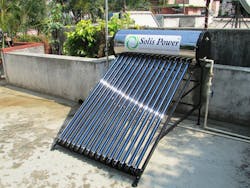State lawmakers encouraging transition to heat pumps for building heating
By Peter Fabris, Contributing Editor
Lawmakers and regulators in an increasing number of states, including California and New York, are changing policies to promote the use of electricity instead of fossil fuels to power building heating and hot water systems.
With renewable power continuing to supplant coal-fired electric generation, electric heat pumps are now often the lowest-carbon choice for heating and cooling buildings and providing hot water. Most efficiency policies in most of the country, though, do not include incentives for homeowners or businesses to install these technologies.
Most policies have focused on reducing energy use regardless of the fuel source; not favoring one fuel over another. There have been notable exceptions, though. Regulators and lawmakers in Alaska, California, Massachusetts, New York, Tennessee, and Vermont are encouraging fuel switching or fuel substitution through guidelines. Other states are also considering policies to promote electric heat pumps.
Improvements to a building shell, such as insulation and air sealing, can help reduce overall heating and cooling loads. This, in turn, can help downsize equipment needs and costs for heat pumps.
